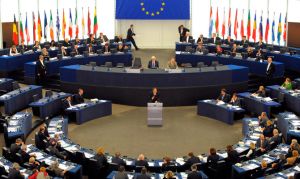Analytics, Economics, Employment, EU – Baltic States, Financial Services, Inflation
International Internet Magazine. Baltic States news & analytics
Friday, 26.04.2024, 03:30
EU Commission ups EU economic growth forecasts
 Print version
Print version |
|---|
The projections are, respectively, 0.1 percentage point and 0.2 percentage points higher than three months ago, when the Commission said it expected the EU economy to increase 1.7% and the eurozone's 1.3% this year.
The EU economic growth forecast for 2016 remains unchanged – 2.1% for the EU economy and 1.9% for the euro area.
The report says that the European economy is boosted by several factors, including low oil prices, global growth, EU fiscal policy, and others.
According to the Commission, inflation in the EU will be close to zero until mid-2015, but the overall inflation for the EU and eurozone this year could be 0.1%, and 1.5% in 2016.
Unemployment in the EU is expected to decrease to 9.6% this year and to 11% in the eurozone countries. The respective forecasts for 2016 are 9.2% and 10.5%.
European Commissioner for the Euro and Social Dialogue Valdis Dombrovskis says that the economic recovery in Europe is gaining momentum, however, the EU should think more about sustainability of the economy. On the other hand, Commissioner for Economic and Financial Affairs, Taxation and Customs Pierre Moscovici notes that the European economy is experiencing its best spring in years.
However, the EU still has a lot to do to maintain its economic growth – foster investment, implement structural reforms, and pursue responsible fiscal policy, said Moscovici.
Latvia's gross domestic product (GDP) this year could grow 2.3%; in 2016 – 3.2%, according to the European Commission's "European Economic Forecast".
The European Commission indicates that Latvia's economy is facilitated by the low oil price and the growing income of households. Nevertheless, Latvia's economy this year could be affected by the deteriorating situation in Russia's economy.
The report says that the unemployment rate in Latvia this year will be 10.4%, but in 2016 – 9.4%.
Latvia's export growth this year will be 2.6%, but import growth – 2.9%.
External trade will accelerate as of 2016, when Latvia's exports could grow 4.6%, and imports – 5.4%. This due to the decreasing exports to Russia and growing demand in the European Union.
The European Commission published its spring forecast on Tuesday; as compared to February, it did not change its assessment, according to which the Estonian gross domestic product (GDP) will grow by 2.3% this year, Public Broadcasting reports.
Next year, the Commission forecasts a growth rate of 2.9%.
This year, Estonia's inflation is expected to remain close to 0.2%, but should rise next year due to the fiscal and wage pressures to 1.9%. The unemployment rate is expected to decline this year to 6.2% and in 2015 to 5.8%.
EC)announced in its Spring 2015 Economic Forecast that Lithuania's gross domestic product (GDP) is expected to grow by 2.8%, whereas domestic consumption should be the major factor determining economic growth, writes LETA/ELTA.
"Expected pick up in investment is set to boost real GDP growth to 3.3% in 2016. Inflation remains low. The improvement in public finances is expected to pause in 2015," the EC report reads.
In February the EC forecast that Lithuania's economy would grow by 3%. Based on the latest forecast, a 0.4% deflation is expected this year, unemployment should stand at 9.9% and the gross public debt is expected to account for 41.7% of Lithuania's GDP.
The EC expects that in 2015 real GDP will grow by 1.8% in the European Union (EU) and by 1.5% in the euro area. For 2016, a 2.1% growth is expected in the EU and of 1.9% in the euro area.
"Europe's economies are benefitting from many supporting factors at once. Oil prices remain relatively low, global growth is steady, the euro has continued to depreciate, and economic policies in the EU are supportive. () All countries in the EU are set to gain from these positive tailwinds. However, the extent to which each economy benefits will depend on its responsiveness to lower oil prices and the depreciation of the euro in particular," the EC report reads.








 «The Baltic Course» Is Sold and Stays in Business!
«The Baltic Course» Is Sold and Stays in Business!

